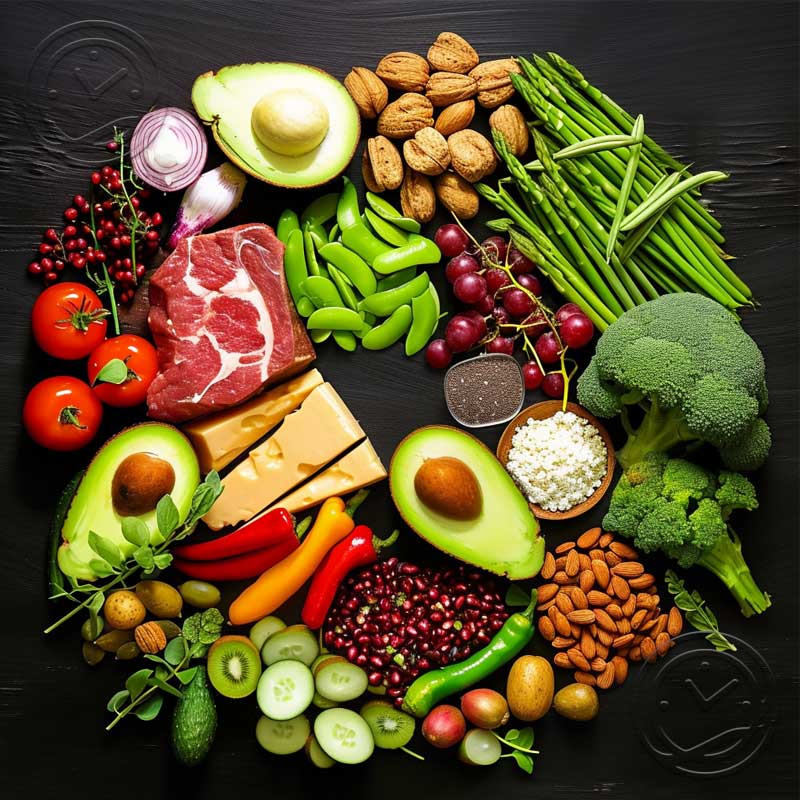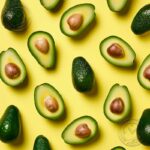What are Carbohydrates?
Carbohydrates are a type of macronutrient that provides the body with energy.
They are found in a variety of foods, including fruits, vegetables, grains, and dairy products.
Carbohydrates are broken down into glucose, which is then used for energy by the body.
There are two types of carbohydrates: simple and complex.
Simple carbohydrates are broken down quickly and provide a quick burst of energy.
Complex carbohydrates are broken down more slowly and provide a longer-lasting source of energy.
The recommended daily intake of carbohydrates is 45-65% of total calories.
However, the amount of carbohydrates you need each day depends on your individual needs and activity level.
Carbohydrates are an important part of a healthy diet, but it is important to eat the right types of carbohydrates in moderation.
Eating too many simple carbohydrates can lead to weight gain and other health problems.
Keto Diet and Carbohydrates
The Keto diet is a low-carbohydrate, high-fat diet that has been shown to have many health benefits, including weight loss, improved blood sugar control, and reduced risk of heart disease.
The Keto diet restricts carbohydrates to a very low level, typically 20-50 grams per day.
This means that most people on the Keto diet will need to eliminate all grains, starches, and sugary foods from their diet.
The goal of the Keto diet is to put your body into a state of ketosis.
Ketosis is a metabolic state in which your body burns fat for energy instead of carbohydrates.
When you eat a low-carb diet, your body produces ketones, which are small molecules that are used as fuel by your brain and other organs.
There are a number of benefits to being in ketosis, including:
- Weight loss: The Keto diet is very effective for weight loss. Studies have shown that people who follow the Keto diet can lose up to 2-3 times more weight than people who follow a traditional low-fat diet.
- Improved blood sugar control: The Keto diet can help to improve blood sugar control in people with diabetes or prediabetes. Studies have shown that the Keto diet can reduce insulin resistance and improve blood sugar levels.
- Reduced risk of heart disease: The Keto diet can help to reduce the risk of heart disease by lowering cholesterol levels and improving blood pressure. If you are thinking about trying the Keto diet, it is important to talk to your doctor first.
The Keto diet is not suitable for everyone, and there are some potential risks associated with the diet.
Vegetarian Diet Protein Sources
Unlock the power of vegetarian protein sources for a healthy diet! Explore diverse options like beans, tofu, nuts, and quinoa,…
How Many Carbs Can You Eat on the Keto Diet?
The Keto diet is a low-carb, high-fat diet that has been shown to have many health benefits, including weight loss, improved blood sugar control, and reduced inflammation.
However, one of the most common questions people have about the Keto diet is how many carbs you can eat on it.
The answer to this question depends on the specific level of the Keto diet you are following.
There are three main levels of the Keto diet:
- Standard Ketogenic Diet (SKD): This is the most common level of the Keto diet and allows for 20-50 grams of net carbs per day.
- Cyclical Ketogenic Diet (CKD): This is a more flexible version of the Keto diet that allows for higher carb days on a regular basis.
- Targeted Ketogenic Diet (TKD): This is a version of the Keto diet that allows for higher carb intake around workouts.
The amount of carbs you can eat on each level of the Keto diet will depend on your individual goals and tolerance.
If you are new to the Keto diet, it is generally recommended to start with the SKD and slowly increase your carb intake as needed.
Here is a table that shows the recommended carb intake for each level of the Keto diet:
| Level of Keto Diet | Net Carbs per Day |
|---|---|
| Standard Ketogenic Diet (SKD) | 20 – 50 grams |
| Cyclical Ketogenic Diet (CKD) | 50 grams |
| Targeted Ketogenic Diet (TKD) | 30 – 50 grams |
It is important to note that the amount of carbs you can eat on the Keto diet is not a set number.
It is a range that you can adjust based on your individual needs.
If you are not sure how many carbs you should be eating on the Keto diet, it is best to talk to a healthcare professional.
For more information on the Keto diet, please see our Keto diet guide.
Foods to Eat
The Keto diet is a low-carb, high-fat diet that has been shown to have many health benefits, including weight loss, improved blood sugar control, and reduced risk of heart disease.
There are many different foods that are allowed on the Keto diet, including:
- Meat: Beef, pork, lamb, chicken, turkey, fish, and seafood
- Eggs
- Vegetables: Leafy greens, broccoli, cauliflower, asparagus, peppers, tomatoes, cucumbers, celery, onions, mushrooms
- Nuts and seeds: Almonds, walnuts, pecans, macadamia nuts, chia seeds, flax seeds
- Healthy fats: Olive oil, avocado oil, coconut oil, butter, ghee
These foods are all low in carbs and high in fat, which is what makes them a good choice for the Keto diet.
In addition to these foods, there are also many other Keto-friendly recipes available online and in cookbooks.
If you are new to the Keto diet, it is a good idea to consult with a registered dietitian or nutritionist to make sure that you are getting the nutrients that you need.
Zone Diet: Boost Your Energy Levels
Unlock boundless energy and optimal health with the Zone Diet! Dr. Barry Sears' revolutionary approach to nutrition isn't just about…
Foods to Avoid
The following foods are not allowed on the Keto diet because they are high in carbohydrates:
- Sugary foods, such as candy, cookies, and cakes
- Starchy foods, such as bread, pasta, and rice
- Grains, such as oats, barley, and wheat
- Fruits, except for a few low-carb fruits, such as berries
- Vegetables, except for a few low-carb vegetables, such as leafy greens and broccoli
These foods are high in carbohydrates and will kick you out of ketosis if you eat them.
If you are following the Keto diet, it is important to avoid these foods as much as possible.
Side Effects
The Keto diet can cause some side effects, which are typically mild and temporary.
These side effects can include:
- Headaches: Some people experience headaches when they first start the Keto diet. This is because your body is adjusting to burning fat for fuel instead of carbohydrates. The headaches usually go away within a few days.
- Fatigue: You may feel tired when you first start the Keto diet. This is because your body is using up its glycogen stores (stored carbohydrates) for energy. Once your body has switched to burning fat for fuel, you should start to feel more energized.
- Nausea: Some people experience nausea when they first start the Keto diet. This is usually caused by the sudden change in your diet. The nausea usually goes away within a few days.
- Diarrhea: Diarrhea can also be a side effect of the Keto diet. This is because your body is producing more bile to help digest the fat you are eating. The diarrhea usually goes away within a few days.
- Constipation: Constipation can also be a side effect of the Keto diet. This is because the Keto diet is low in fiber. You can help prevent constipation by eating plenty of vegetables and fruits.
- Bad breath: Some people experience bad breath when they first start the Keto diet. This is because your body is producing ketones, which can give your breath a fruity odor. The bad breath usually goes away within a few weeks.
These side effects are typically mild and temporary.
If you experience any severe side effects, such as vomiting, dizziness, or fainting, you should see your doctor.
Here are some tips for managing the side effects of the Keto diet:
- Drink plenty of water.
- Get enough electrolytes.
- Eat plenty of vegetables and fruits.
- Take a probiotic.
- Avoid processed foods.
By following these tips, you can help minimize the side effects of the Keto diet.
Unlock the power of a ketogenic diet! Discover how this high-fat, low-carb lifestyle can help you achieve weight loss, better…
Safety
The Keto diet is generally considered to be safe for most people, but there are some people who should not follow it.
These include people with:
- Kidney disease
- Pancreatic disease
- Liver disease
- Heart disease
- High cholesterol
- Gestational diabetes
- Underweight
People with these conditions should talk to their doctor before starting the Keto diet.
The Keto diet can also cause side effects, such as:
- Headaches
- Nausea
- Diarrhea
- Constipation
- Fatigue
- Muscle cramps
- Trouble sleeping
These side effects usually go away within a few weeks, but if they persist, you should talk to your doctor.
It is important to note that the Keto diet is not a magic bullet for weight loss.
It is a diet that is high in fat and low in carbohydrates, and it can be difficult to stick to.
If you are considering starting the Keto diet, you should talk to your doctor first to make sure it is right for you.
Conclusion
In conclusion, the Keto diet is a low-carb, high-fat diet that has been shown to be effective for weight loss and improving blood sugar control in people with diabetes.
However, it is important to note that the Keto diet is not for everyone and can have some side effects, such as constipation, fatigue, and headaches.
If you are considering trying the Keto diet, be sure to talk to your doctor first to make sure it is right for you.






